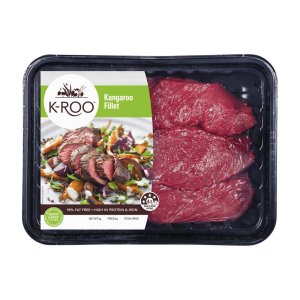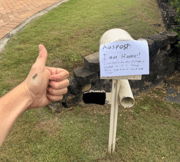International sportswear giant under fire: Kangaroo leather controversy kicks off ethical debate
- Replies 6
As the world becomes increasingly conscious of ethical consumerism, the spotlight often falls on the practices of major corporations and their impact on wildlife and the environment.
This is particularly true for a global sportswear giant that has recently found itself at the centre of a heated debate over the material it uses in shoes.
The controversy has sparked outrage among animal rights activists and has led to a public outcry for change.
At the heart of the issue is the use of leather sourced from wild Australian animals, specifically kangaroos.
Adidas CEO Björn Gulden faced a barrage of criticism when five determined protesters disrupted the company's annual general meeting.
They carried a sign reading ‘Kangaru leder grausam’ that translated to ‘Kangaroo leather is cruel’, a message that resonated with many who oppose Australia's large-scale wildlife culling.

Australia's mass killing of five macropod species, which include kangaroos, wallaroos, and wallabies, represents the largest slaughter of land-based wildlife globally.
While the government promotes the export of kangaroo skins and meat as ‘sustainable’ and ‘environmentally friendly’, critics abroad denounced it as barbaric, drawing comparisons to Japan's dolphin hunting program and Canada's seal clubbing.
The protesters' main contention was that Adidas's use of kangaroo leather contradicts the company's own policies on the humane treatment of animals.
They highlighted the lack of oversight for kangaroo harvesters, who operate in regional and remote areas of Australia, raising serious concerns about the welfare of these animals.
Furthermore, the Australian guidelines that require the killing of orphaned joeys after their mothers are shot add another layer of ethical complexity to the issue.
During the AGM, heavily edited video footage showed the moment Animal Rebellion activists took the stage, confronting Gulden with images of kangaroo hunts.
The CEO admitted, ‘I also find the images of the hunts and what happens there terrible.’
Gulden's response, captured in the video, suggested that Adidas might be considering a shift away from kangaroo leather, following in the footsteps of competitors like Nike, Puma, and New Balance.
‘We will certainly, maybe, switch faster than you think,’ Mr Gulden said.
Last year. these companies have already committed to using synthetic alternatives, which they claim are superior to the wild-shot animal skins known for their flexibility and durability.
This was followed by a four-year international campaign where protesters forcibly entered the retailer’s stores.
Adidas' response to inquiries about the CEO's comments and the company's stance on animal welfare has been less than clear.
While Adidas maintained that the kangaroos are not killed specifically for their shoes and that the leather is a by-product of ‘population control’, they have not provided details on how animal welfare is monitored during the hunts.
‘We source the leather exclusively from suppliers that are monitored and certified by the Australian government, ensuring both animal welfare and the conservation of species,’ the company responded.
The Director of the Kangaroos Are Not Shoes Campaign, Jennifer Skiff, expressed her admiration for the Animal Rebellion protesters' actions at the AGM on May 16 in Furth, Germany.
With most major retailers ceasing the use of K-leather, she is hopeful that Adidas will soon follow suit.
Despite the divisive appearance of the protest, reports indicated that the interaction was civil, with the audience even applauding as the protesters left the meeting.
‘The atmosphere inside, by Mr Gulden and the audience was friendly and the audience applauded as they left,’ Ms Skiff recalled.
Karola Mang of Animal Rebellion explained her motivation for storming the stage, saying ‘At first, I didn't realise how terrible the hunt is. I was very moved by the suffering of the joeys that lose their mothers and suffer and die in agony.’
‘When I found out Adidas was the last major company to support this and was using flimsy excuses to justify their participation, I realised I had to do something against it.’
The controversy surrounding Adidas' use of Australian kangaroo leather for its shoes sparked widespread criticism and protests against its CEO.
As activists voice their concerns about the ethical implications of using kangaroo skins in footwear production, it sheds light on the broader conversation about wildlife conservation and animal welfare.
Meanwhile, recent research into the social dynamics of kangaroos reveals surprising insights into the complexity of their social lives, challenging traditional perceptions of these iconic Australian animals.
 Have you encountered similar ethical dilemmas in your shopping experiences? How do you balance convenience, quality, and ethical considerations when choosing products? Share your thoughts and join the conversation in the comments below.
Have you encountered similar ethical dilemmas in your shopping experiences? How do you balance convenience, quality, and ethical considerations when choosing products? Share your thoughts and join the conversation in the comments below.
This is particularly true for a global sportswear giant that has recently found itself at the centre of a heated debate over the material it uses in shoes.
The controversy has sparked outrage among animal rights activists and has led to a public outcry for change.
At the heart of the issue is the use of leather sourced from wild Australian animals, specifically kangaroos.
Adidas CEO Björn Gulden faced a barrage of criticism when five determined protesters disrupted the company's annual general meeting.
They carried a sign reading ‘Kangaru leder grausam’ that translated to ‘Kangaroo leather is cruel’, a message that resonated with many who oppose Australia's large-scale wildlife culling.

Adidas CEO Björn Gulden faced protests at the company's AGM regarding their use of kangaroo leather. Credits: Animal Rebellion
Australia's mass killing of five macropod species, which include kangaroos, wallaroos, and wallabies, represents the largest slaughter of land-based wildlife globally.
While the government promotes the export of kangaroo skins and meat as ‘sustainable’ and ‘environmentally friendly’, critics abroad denounced it as barbaric, drawing comparisons to Japan's dolphin hunting program and Canada's seal clubbing.
The protesters' main contention was that Adidas's use of kangaroo leather contradicts the company's own policies on the humane treatment of animals.
They highlighted the lack of oversight for kangaroo harvesters, who operate in regional and remote areas of Australia, raising serious concerns about the welfare of these animals.
Furthermore, the Australian guidelines that require the killing of orphaned joeys after their mothers are shot add another layer of ethical complexity to the issue.
During the AGM, heavily edited video footage showed the moment Animal Rebellion activists took the stage, confronting Gulden with images of kangaroo hunts.
The CEO admitted, ‘I also find the images of the hunts and what happens there terrible.’
Gulden's response, captured in the video, suggested that Adidas might be considering a shift away from kangaroo leather, following in the footsteps of competitors like Nike, Puma, and New Balance.
‘We will certainly, maybe, switch faster than you think,’ Mr Gulden said.
Last year. these companies have already committed to using synthetic alternatives, which they claim are superior to the wild-shot animal skins known for their flexibility and durability.
This was followed by a four-year international campaign where protesters forcibly entered the retailer’s stores.
Adidas' response to inquiries about the CEO's comments and the company's stance on animal welfare has been less than clear.
While Adidas maintained that the kangaroos are not killed specifically for their shoes and that the leather is a by-product of ‘population control’, they have not provided details on how animal welfare is monitored during the hunts.
‘We source the leather exclusively from suppliers that are monitored and certified by the Australian government, ensuring both animal welfare and the conservation of species,’ the company responded.
The Director of the Kangaroos Are Not Shoes Campaign, Jennifer Skiff, expressed her admiration for the Animal Rebellion protesters' actions at the AGM on May 16 in Furth, Germany.
With most major retailers ceasing the use of K-leather, she is hopeful that Adidas will soon follow suit.
Despite the divisive appearance of the protest, reports indicated that the interaction was civil, with the audience even applauding as the protesters left the meeting.
‘The atmosphere inside, by Mr Gulden and the audience was friendly and the audience applauded as they left,’ Ms Skiff recalled.
Karola Mang of Animal Rebellion explained her motivation for storming the stage, saying ‘At first, I didn't realise how terrible the hunt is. I was very moved by the suffering of the joeys that lose their mothers and suffer and die in agony.’
‘When I found out Adidas was the last major company to support this and was using flimsy excuses to justify their participation, I realised I had to do something against it.’
The controversy surrounding Adidas' use of Australian kangaroo leather for its shoes sparked widespread criticism and protests against its CEO.
As activists voice their concerns about the ethical implications of using kangaroo skins in footwear production, it sheds light on the broader conversation about wildlife conservation and animal welfare.
Meanwhile, recent research into the social dynamics of kangaroos reveals surprising insights into the complexity of their social lives, challenging traditional perceptions of these iconic Australian animals.
Key Takeaways
- Adidas CEO Björn Gulden faced protests at the company's annual general meeting over the use of kangaroo leather in their products.
- Protesters argued that Adidas's use of kangaroo leather violates its policies on the humane treatment of animals and that the harvest process is not adequately monitored for animal welfare.
- Other major shoe brands have previously announced plans to replace kangaroo leather with synthetic alternatives following international campaigns.
- Adidas stated that the leather used in their products is sourced from government-monitored and certified suppliers as part of ‘population control’; however, it did not respond to requests for clarification on how animal welfare is monitored.








